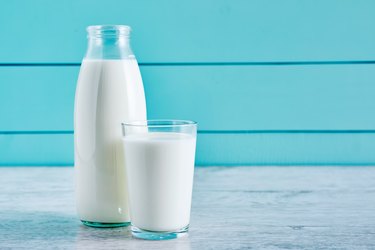
Plenty of people avoid dairy, but not all do so for the same reason. While those with an intolerance to the sugar in milk can seek out a lactose-free milk brand like Lactaid, those who have an allergy to milk protein will likely have to find a dairy-free milk alternative.
Tip
Lactaid is formulated for people who are avoiding milk sugar (lactose) but is not an appropriate option for people with an allergy to milk protein.
Video of the Day
Lactose Intolerance vs. Milk Allergy
People who are lactose intolerant and people who have a milk allergy need to avoid traditional cow's milk, as it could make them sick. People who are lactose intolerant cannot digest lactose, a type of sugar found in milk and dairy products, explains the Cleveland Clinic. Not often seen in infants or young children, lactose intolerance is frequently suffered by adults, who will have bloating and diarrhea after consuming dairy products.
Video of the Day
Then there are people who have an adverse reaction to milk protein. The Mayo Clinic notes that there are two types of milk protein — casein and whey — and the immune systems of people who are allergic see these types of protein as harmful. Therefore, when people with a milk allergy consume casein or whey, they will suffer severe symptoms: hives, wheezing, itching, coughing, shortness of breath, vomiting and swelling of the lips, tongue or throat.
In time, a person with a milk allergy could see such symptoms as loose stools, bloody diarrhea, abdominal cramps, running nose, watery eyes and for babies, colic. A milk allergy can even cause life-threatening anaphylaxis, in which the airways narrow and breathing becomes restricted.
It is also possible to be intolerant of, although not allergic to, milk protein. A milk protein intolerance might result in digestive upset from consuming milk or milk products, including bloating, gas or diarrhea, but it you won't see the severe symptoms you would if you were actually allergic.
Read more: What Are Some Disadvantages of Dairy Milk?
Lactaid and Other Alternatives
Someone with a milk allergy and someone who is lactose intolerant will need to seek different alternatives to traditional milk. People with lactose intolerance can opt for lactose-free milk brands like Lactaid. As explained on the product's website, Lactaid is formulated for people with lactose intolerance, as the lactose in Lactaid is already broken down into the more easily digested sugars glucose and galactose; however, it still contains milk protein (8 grams per 1-cup serving).
Someone who is avoiding milk protein needs to avoid dairy milk and other dairy products, as well as some products that are labeled "nondairy" but still contain milk proteins. Check the ingredient list and avoid foods with whey, casein, ingredients with the prefix "lact" (lactose, lactate), chocolate, nougat, caramel, protein powder, artificial butter flavor, artificial cheese flavor and hydrolysates.
If you have a milk allergy and are seeking something to pour over your cereal or dunk your chocolate chip cookies into, try finding a dairy-free milk that you enjoy. However, be sure to read the nutrition label.
A September 2016 article published in the Journal of Food Science and Technology looked at the plant-based dairy-free milk products on the market and noted that, although they are increasing in popularity and some do adequately mimic the taste of cow's milk, these alternatives are not always nutritionally the same.
However, a common plant-based option, soy milk, remains popular with people who are allergic to milk proteins and are lactose intolerant, and soy protein has been shown to help ward off some disease states, reports the Journal of Food Science and Technology. It's not the perfect alternative, as the bean-like taste of some brands of soy milk might be off-putting for some consumers.
Unfortunately, the Mayo Clinic notes that a few people who are allergic to cow's milk will also be allergic to soy milk.